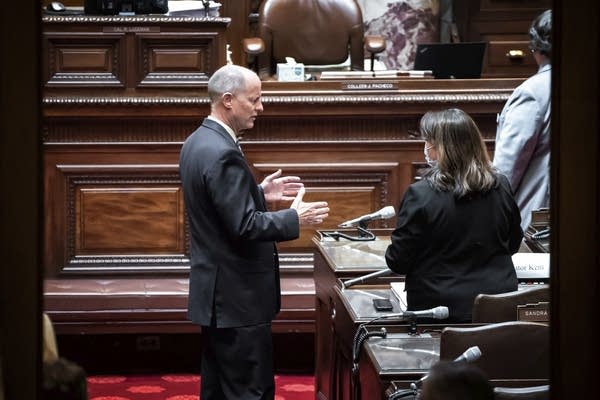Suburbs loom large in campaign for legislative control

Go Deeper.
Create an account or log in to save stories.
Like this?
Thanks for liking this story! We have added it to a list of your favorite stories.
This year’s election could shift Republican control of the Minnesota Senate, the DFL control of the House, both or neither. Candidates from both parties are making their case during an unusual election season that has been altered by COVID-19, and all sides are keeping a close eye on the metro suburbs.
DFL candidates are spending a lot of time on the telephone this campaign season, said House Speaker Melissa Hortman, DFL-Brooklyn Park. They’ve also been holding socially distanced conversations with voters in local parks, and COVID-19 is a top campaign issue. Traditional door knocking by DFL candidates has gone by the wayside this year, Hortman said.
“We really feel a responsibility to keep members of the public safe. And so, we have engaged in campaign activities that we are certain would not spread the virus.”
Hortman is confident about holding the House majority Democrats won in 2018, and possibly widening it. The current advantage is 16 seats. Hortman said the battleground remains in the suburbs, where President Donald Trump ran into a backlash among voters two years ago.
Turn Up Your Support
MPR News helps you turn down the noise and build shared understanding. Turn up your support for this public resource and keep trusted journalism accessible to all.
“That favored us in 2018 and looks as though it will favor us again in 2020,” she said.
On the other side of the aisle, Republican House Minority Leader Kurt Daudt is also optimistic about GOP prospects. He said he believes flipping control of the House is within reach. Daudt, R-Zimmerman, said some rural DFL lawmakers are vulnerable, and he likes the chances of former members who are running again this year for suburban seats.
Republican candidates have an advantage, Daudt said, because they continue to knock on doors.
“I don’t know how you make connections with voters without talking to them,” Daudt said, adding that law and order issues are clearly the top concern among voters.
“On that issue, voters support us overwhelmingly,” he said.
Republicans running for the Minnesota Senate are also pushing hard on the law and order theme.
Senate Majority Leader Paul Gazelka says it’s a particular concern in suburban districts, those that Republicans are defending and those that they’re trying to flip. On a bipartisan basis, lawmakers passed key police accountability measures into law this summer following the killing of George Floyd and resulting civil unrest. But Gazelka, R-East Gull Lake, claimed Democrats have fallen short on supporting police.
“I think that’s a major issue that we have consistently talked about, making sure people are safe and making sure that our good law enforcement people have the tools they need,” he said. “So, there’s definitely a distinction there, and I think we’re on the right side of that issue.”
Republicans are nursing a slim 35-32 advantage in the Senate. They believe they can widen the margin with potential pick-ups in rural districts where Trump won four years ago. They’re also targeting the Lakeville area seat that they lost four years ago, while playing defense in other suburban districts.
Senate Minority Leader Susan Kent said she believes DFL pickups are possible in the suburbs. They also have their eyes on some Rochester area seats currently held by Republicans.
Kent also has her own suburban district in Woodbury to worry about. She’s facing a reelection challenge from Republican Mary Giuliani Stephens, a former Woodbury mayor who made an unsuccessful bid for governor in 2018.
Kent said she thinks the current rural DFL senators in Trump country can be protected, in spite of the president's popularity there.
“These individuals have been super focused on their communities, which is the job we’re sent here to do,” Kent said. “Those are the elected officials that can withstand the nationalization of an election.”


